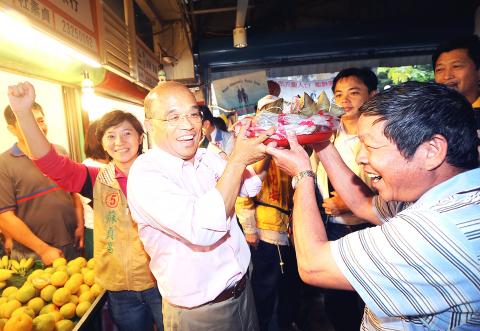The close race between the two Taipei mayoral candidates has prompted the two camps to largely abandon traditional hard-line campaign strategies and de-emphasize party loyalty for the purpose of attracting support from swing voters, as the election looms in less than 10 days.
Both Taipei Mayor Hau Lung-bin (郝龍斌) of the Chinese Nationalist Party (KMT) and Democratic Progressive Party (DPP) Taipei mayoral candidate Su Tseng-chang (蘇貞昌) so far this month have refrained from holding large-scale campaign events to consolidate their base. Instead, they have filled daily schedules with visits to local districts to interact with residents.
For Hau, who has always been awkward expressing himself in public, communicating with voters face-to-face has not been his forte. To help him enhance his connection with voters, the KMT has arranged for President Ma Ying-jeou (馬英九), who doubles as the KMT chairman, and KMT -Secretary-General King Pu-tsung (金溥聰), to accompany Hau he intensively canvass the streets this month looking for support.

PHOTO: FANG PIN-CHAO, TAIPEI TIMES
Last week alone, Ma campaigned for the mayor on three consecutive days. He spent more than two hours at the Raohe Street night market on Saturday night, leading Hau to shake hands with visitors, and sat down chatting with vendors while eating stinky tofu.
The 58-year-old mayor has also learned to stay and chat with the crowd when attending municipal activities, rather than leaving immediately after addressing the events.
Although the KMT is holding a rally on Sunday for Hau, it is playing down its previous campaign theme of anti-corruption in response to former president Chen Shui-bian’s (陳水扁) most recent sentence of a total of 19 years of for corruption charges, and the KMY is turning it into a carnival-like event.
King said the rally, named “A Walk for -Taipei-Taipei Flies High,” will be filled with balloons and toys, and all of Taipei’s residents are welcome to share their thoughts about the city’s future.
The new strategy to tone down the traditional “deep-blue” rhetoric in Hau’s election campaign can also be found in his latest campaign ad, in which he carries a girl on his back wearing a pink T-shirt. The KMT’s blue party color was absent in the ad.
Su, on the other hand, has been leading a non-traditional campaign since the very beginning. With the slogan “Let Taipei surpass Taipei,” his campaign has focused more on social welfare issues and has adopted bright colors such as orange and pink for his campaign.
He has made use of popular online social networking services like Facebook and Plurk to discuss municipal issues and has replaced large-scale campaign activities with hip-hop concerts and “living room meetings” in all of the city’s 12 districts, where local residents have been invited to share their concerns with him.
As a seasoned politician who has maintained a grassroots style, Su interacts with voters more passionately than his KMT counterpart and never hesitates to shake hands or give hugs to supporters.
Su’s campaign spokesman Lee Hou-ching (李厚慶) said reshaping the political alignment in Taipei City, a traditional KMT stronghold, is a main reason behind Su’s decision to run in the election.
The increasing number of swing voters in this election campaign, Lee said, showed that the traditional support bases of the pan-blue and pan-green camps in the city can be changed.

Alain Robert, known as the "French Spider-Man," praised Alex Honnold as exceptionally well-prepared after the US climber completed a free solo ascent of Taipei 101 yesterday. Robert said Honnold's ascent of the 508m-tall skyscraper in just more than one-and-a-half hours without using safety ropes or equipment was a remarkable achievement. "This is my life," he said in an interview conducted in French, adding that he liked the feeling of being "on the edge of danger." The 63-year-old Frenchman climbed Taipei 101 using ropes in December 2004, taking about four hours to reach the top. On a one-to-10 scale of difficulty, Robert said Taipei 101

Nipah virus infection is to be officially listed as a category 5 notifiable infectious disease in Taiwan in March, while clinical treatment guidelines are being formulated, the Centers for Disease Control (CDC) said yesterday. With Nipah infections being reported in other countries and considering its relatively high fatality rate, the centers on Jan. 16 announced that it would be listed as a notifiable infectious disease to bolster the nation’s systematic early warning system and increase public awareness, the CDC said. Bangladesh reported four fatal cases last year in separate districts, with three linked to raw date palm sap consumption, CDC Epidemic Intelligence

US climber Alex Honnold left Taiwan this morning a day after completing a free-solo ascent of Taipei 101, a feat that drew cheers from onlookers and gained widespread international attention. Honnold yesterday scaled the 101-story skyscraper without a rope or safety harness. The climb — the highest urban free-solo ascent ever attempted — took just more than 90 minutes and was streamed live on Netflix. It was covered by major international news outlets including CNN, the New York Times, the Guardian and the Wall Street Journal. As Honnold prepared to leave Taiwan today, he attracted a crowd when he and his wife, Sanni,

Two Taiwanese prosecutors were questioned by Chinese security personnel at their hotel during a trip to China’s Henan Province this month, the Mainland Affairs Council (MAC) said yesterday. The officers had personal information on the prosecutors, including “when they were assigned to their posts, their work locations and job titles,” MAC Deputy Minister and spokesman Liang Wen-chieh (梁文傑) said. On top of asking about their agencies and positions, the officers also questioned the prosecutors about the Cross-Strait Joint Crime-Fighting and Judicial Mutual Assistance Agreement, a pact that serves as the framework for Taiwan-China cooperation on combating crime and providing judicial assistance, Liang